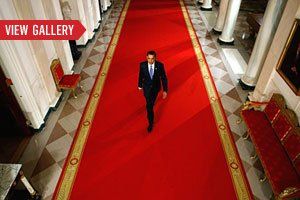
Here is a wild proposition, one that many who obsessively follow politics did not expect to entertain before Memorial Day. What if Barack Obama is not a tone-deaf big spender who misread the public on large-scale government reform such as health care, but is, instead, what he has always been: a smart, steady, and unobtrusively savvy politician whose long-term bets (his first being winning the presidency itself) are well--considered? Only a few months ago it was, as Republican House leader John Boehner put it, Armageddon on the Potomac, and Obama and the Democrats were to be the chief victims of the furies. I am mixing Christian and pagan imagery, but you get the point.
Gallup's daily tracking numbers put the president's job--approval rating at 52 percent, which ranks him ahead of both Reagan and Clinton at similar points in their first terms. The generic congressional ballot is now even, with 46 percent saying they will vote for a Democrat and 46 a Republican. Incumbents are falling from power in states ranging from Utah to West Virginia, but the common denominator is their incumbency, not their party. Despite worries about the Greek crisis and the wildly fluctuating Dow Jones industrial average, Gallup finds that "economic confidence remains at its best level of the year in early May, matching April. Americans' expectations about the economy going forward also remain at their highest since the recession began, with 41 percent of Americans saying U.S. economic conditions are getting better."
How much of the good, or at least better, economic news is directly attributable to the administration is, as ever, uncertain. But we do know this: if Americans were feeling worse about things, Obama would be paying the political price. And so he benefits from the bounce—and he knows that he will suffer from a fall.
The president's stoic acceptance of the cycles of politics is less appreciated than it might be. I think this is because his once frequent talk of changing Washington helped create the impression that Obama was a goo-goo, a dreamer, when he is in fact more of a realist than a radical.
The young president we meet in the pages of my colleague Jonathan Alter's wonderful new book, The Promise: President Obama, Year One, is a man of both ideas and action, a big thinker who intuitively understands the limits and the possibilities of politics. "Early on, Obama tried to lay out an operating principle for his administration," Alter writes. "It was, not surprisingly, a character trait rather than an ideological idea: 'That whole philosophy of persistence is one that I'm going to be emphasizing again and again as long as I'm in office. I'm a big believer in persistence.'?"
Around Thanksgiving 2009, a low point for the president, Alter reports that Obama asked an old friend, "Who would really want this job for more than one term?" Then he added: "But I have to run now, otherwise it'll mean letting someone like Mitt Romney step in and get credit for the good stuff that happens after we've been through all this crap." Of course he will run. Alter quotes an Obama friend saying: "He knows he will have to spend a lot of his life after age 54 living with what he accomplished or failed to accomplish as president. It's unimaginable to him to have to live in his 50s, 60s, and 70s without having made the most of it."
There is more than a whiff of pridefulness in the president's account of his own foreign policy. To Alter he characterizes his record abroad as "a pretty flawless execution of what our strategy was at the beginning of [2009]… We said very early on that we had to get all the nations of the world to cooperate around the financial crisis—and to a remarkable degree, they have…We said we wanted to take an engagement approach with Iran and North Korea [so that] we could guarantee international consensus if they reacted badly—and we have."
Obama knows what history has dealt him. "This is not a normal presidential situation that I find myself in," the president told Alter at the end of 2009. "I mean, we have the most difficult set of challenges facing the country since the Great Depression. And that's not hyperbole—it's subject to objective proof." They were sitting in the Oval Office, and the president, Alter writes, chuckled slightly. "When an [H1N1] pandemic ranks fourth or fifth on my list of things to do—you know you've got a lot of stuff on your plate."
And so one suspects the president cannot help but be pleased by the suddenly favorable numbers he is no doubt reading. And one knows that he knows how quickly they can tumble again.
Uncommon Knowledge
Newsweek is committed to challenging conventional wisdom and finding connections in the search for common ground.
Newsweek is committed to challenging conventional wisdom and finding connections in the search for common ground.





